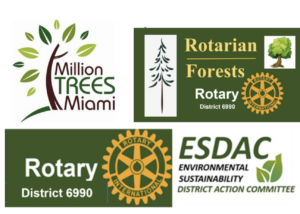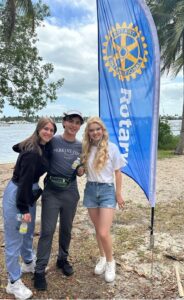By Robert Bull, Rotary Club of Pinecrest, D 6990

Million Trees Miami, Rotary District 6990, Rotarian Forests, and ESDAC
Finding locations for planting over a hundred trees within an urban environment can be challenging. Florida’s Miami-Dade County includes over thirty-four unique and separate municipalities, each with their own local government, parks and facilities. While the Greater Miami area is in a subtropical region with plenty of rainfall, the tree canopy of the city is not up to standard. Fortunately, the county’s Parks, Recreation, and Open Spaces Department has a tree planting initiative, Million Trees Miami, whose sole purpose is to rectify this. Rotarians have embraced this challenge and we’re now recognized as a major part of the solution.
About five years ago when I was community service chair for the Rotary Club of Miami, I started including environmental projects amongst our programs. We conducted beach cleanups and then added tree-planting activities. We have created a close association with this county initiative and have planted nearly two thousand trees in several locations, creating forests in several areas of the county. Because of this impact the program is now called Rotarian Forests.
We’re excited to do this because we know that trees are great at capturing CO2, absorbing water, preventing soil and beach erosion, and mitigating urban heat islands which endanger our neighbors, particularly in lower-income communities.
The driving force behind District 6990’s environmental programs is the Environmental Sustainability District Action Committee (ESDAC), whose mission aligns with ESRAG. ESDAC’s objective is to motivate clubs to support the environment by sharing ideas and best practices. ESDAC publishes a monthly bulletin, highlighting each club’s activities and encouraging participation in upcoming activities.

Participating high school students receive community service hours, which they need to graduate. Another benefit of including these young volunteers is that they can assist older Rotarians who might have trouble digging holes for the trees.
Our most recent tree-planting was on January 27th, 2024 at the North Pointe Community Center near the border between Miami-Dade and Broward County. We chose this location for easy access for Rotarians from both Miami-Dade and Broward Counties. Interact and Rotaract clubs were also invited. Participating high school students receive community service hours, which they need to graduate. Another benefit of including these young volunteers is that they can assist older Rotarians who might have trouble digging holes for the trees. You can see Rotarians, Rotaractors, and Interactors having a wonderful time planting 200 trees in this video from February 2022.
During the January, 2024 tree planting we also prepared rain gardens, purpose-built near parking areas to capture the runoff of rainwater, which often carries pollutants. Rain gardens have berms that prevent the runoff from flowing into streets and canals. They capture the water, the plants absorb the pollutants, and clean water filters down to the water table. Additionally, many of these plants support pollinators.
We also planted pollinator shrubs on Sunday, Feb. 12, 2023 at Pelican Island Maritime Hammock. This island can only be reached by boat even though it is just a few hundred yards away from the mainland. The conventional wisdom is that you can’t succeed with a service project on a Sunday, but we provided a BBQ and over 100 volunteers showed up from various Rotary, Interact and Rotaract Clubs, plus friends and students. That included the Mayor of Miami-Dade County, Daniella Levine Cava, joined by Miami-Dade Parks Director Maria Nardi and the County’s Chief Heat Officer Jane Gilbert. At the event we also cleaned up plastic and other debris from the island’s coastline.
Our relationship with Million Trees Miami has provided us an unexpected benefit. They post our activities on their social media sites and periodicals, giving Rotary greater exposure. A great example is this video with the Mayor (also a Rotarian) rejoicing at our success on Pelican Island.
The key point for a successful tree planting activity is having engaged members in our Clubs. Every Club is encouraged to have an environmental chair and committee. The environmental chair should carry the environmental “banner,” leading and motivating club members to participate in any way they can.
Our District Governor fully supports these programs, annually providing the Governor’s Environmental Award to recognize the Club who has performed the most environmental activities that year. Other clubs that have reached certain thresholds receive a Governor’s Environmental Citation at three levels: Bronze, Silver and Gold.
ESDAG’s monthly bulletin and social media keep Rotarians and friends updated on Rotary environmental activities. To inspire broader support and involvement in Rotarian Forests, Rotarians, friends, and family are invited to purchase a Dedication Heart in memory or in honor of a loved one or in honor of a cause.
Everyone who purchases a Dedication Heart receives an emailed certificate. Those who cannot attend the planting also receive a photo of their Dedication Heart on a tree. This builds enthusiasm for those who attend the tree planting and expectations for those who cannot. Preparing the Dedication Hearts ahead of time is a bit cumbersome, but watching the emotions of the participants is worth it. Sometimes a few participants even cry when placing the Hearts on their tree(s). It is truly a moving experience.
Robert Bull is originally from Venezuela and his career has spanned four continents. In 2002 he joined the Rotary Club of Miami, serving as President during the COVID lockdown. He chairs D 6990’s Environmental Sustainability District Action Committee, ESDAC. In 2023 he joined the Rotary Club of Pinecrest, which at that time had only three active members. He is currently President-Elect and the Pinecrest Club has grown to twenty-seven members.

